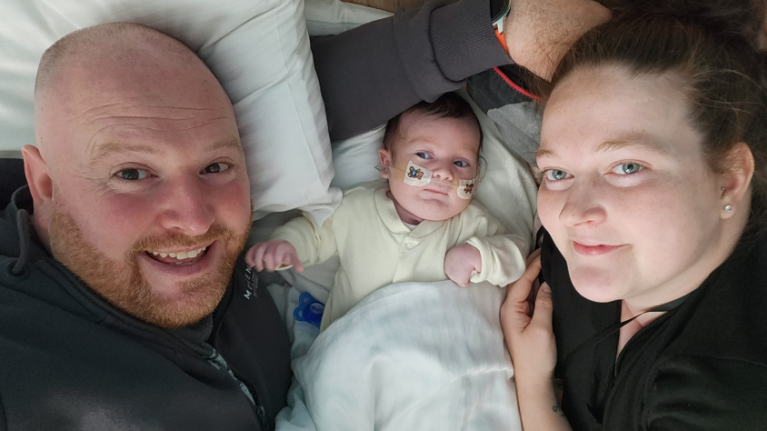
A new report from Together for Short Lives, the UK’s children’s palliative care charity, shows that in many places across the UK, families caring for seriously ill child cannot access the palliative and end of life care they need:
- Only a third of local areas in England are meeting the required standard for 24/7 end of life care for children at home.
- The postcode lottery is being driven by workforce shortages, inconsistencies in the way support is planned and funded by local NHS and council bodies, and an estimated £295m children’s palliative care funding gap in England.
- As it launches its Short Lives Can’t Wait campaign, Together for Short Lives is calling for the UK’s governments, NHS bodies and local authorities to take immediate action for the UK’s 99,000 seriously ill children and their families.
The charity’s new report Short Lives Can’t Wait: the State of Children’s Palliative Care in 2024 identifies huge differences across the UK in the way children’s palliative care is planned, funded and provided.
Of particular concern is children and families’ access to end of life care at home, 24 hours a day, seven days a week, provided by nurses and supported by advice from consultant paediatricians specially trained in paediatric palliative medicine.
The charity found that this standard is met in just a third (30%) of NHS integrated care board (ICB) areas in Englandii, with nearly a half (47%) partially meeting it and one quarter (23%) not meeting it at all.
The 24/7 end of life care at home standard is not met at all in Northern Ireland and only in a minority of areas in Scotland and Wales.
The charity has identified the three main factors causing this postcode lottery: funding gaps, workforce shortages and a lack of leadership and accountability from the UK and devolved governments. For example, in England alone, the gap in NHS children’s palliative care funding across hospital, community and children’s hospice services in England will be £295 million in 2024/25.
NHS community children’s nurses (CCNs) are critical in supporting parents to provide 24/7 palliative care to children at home. For safe staffing levels to be met, 4,960 CCNs would be working in England, yet only 902 CCNs are currently employed by the NHS. In Wales, an additional 208 are needed.
Andy Fletcher, Chief Executive of Together for Short Lives, said: “It is unacceptable that families of seriously ill children are not getting the palliative and end of life care they need because of where they live. This is care that is clearly set out in standards, guidance and even the law.
“Time is short for seriously ill children and their families. They cannot wait months for the next election, the next spending review, the next set of planning guidance. Neither should they have to rely on the generosity of the public to access the care they need, much of which is provided by the voluntary sector. We would not accept maternity services relying on donations when a child’s life begins, so why do we accept this for palliative care when a child’s life ends?
“The UK’s governments must fill the funding gap, invest in education and training and hold local NHS bodies and councils to account. Failure to act will not only continue to put added strain on struggling families but will also continue to waste NHS money, at a time when it cannot afford to do so, through avoidable hospital admissions.”

For dad Jim, from Eltham in London, the issues the report identifies are having a very real impact on his life as his 17-month-old son Jaxson’s primary carer. Jaxson has Hypoplastic Left Heart Syndrome and a very rare genetic disorder called Mowat-Wilson Syndrome. Since he was referred for palliative care in September last year, Jaxson was also referred to their local NHS community nursing team but is yet to receive a visit. According to Jim, if it weren’t for Demelza Children’s Hospice, they would be completely on their own.
“I’ve ended up doing my own research and reading the NICE guidelines to understand which care we should be receiving. Things just don’t seem to match up. There seems to be a disconnect between what should be done, and what is being done.”
Jim’s biggest issue recently has been trying to find the syringes he needs to deliver Jaxson’s oral medication. The family were advised to re-use the syringes, sterilising them between each use, but they don’t administer the medicine as smoothly once they are reused and this can exacerbate Jaxson’s reflux.
“It is a constant battle, but it shouldn’t be. We tried the health visitor, pharmacy, nursing team, continuing care team, GP, we even walked into A&E.”
It was only after Jim spoke at a recent All-Party Parliamentary Group for Children Who Need Palliative Care event that he finally saw progress on the syringes Jaxson needed, thanks to NHS officials in attendance. Yet despite their efforts, the syringes they received weren’t the right ones and the family is still waiting.
“I am grateful for the help, but it shouldn’t have taken me going to an event in parliament for this to happen, and it’s not a long-term change to the system or to the other care Jaxson is supposed to have. We also really need to see that same urgency for the thousands of families like mine who aren’t getting the support they need and who don’t have the opportunity to go to parliament and speak directly to MPs.”
Jim has written an open letter to Prime Minister Rishi Sunak and is asking others to sign and join Together for Short Lives’ Short Lives Can’t Wait campaign.
It’s heart-breaking to hear from parents like Jim, who are struggling every day because the system that is supposed to care for them isn’t able to. Those in power must take action to make things better now, because children like Jaxson cannot wait any longer.
Andy Fletcher, Chief Executive of Together for Short Lives
